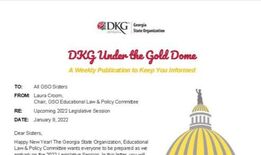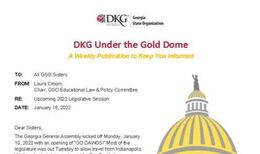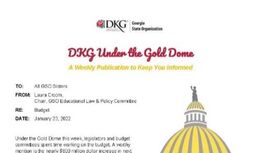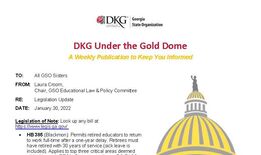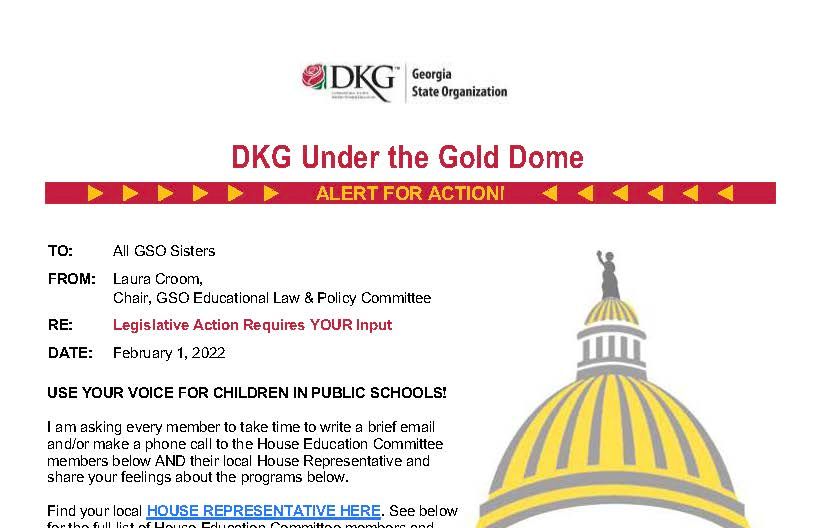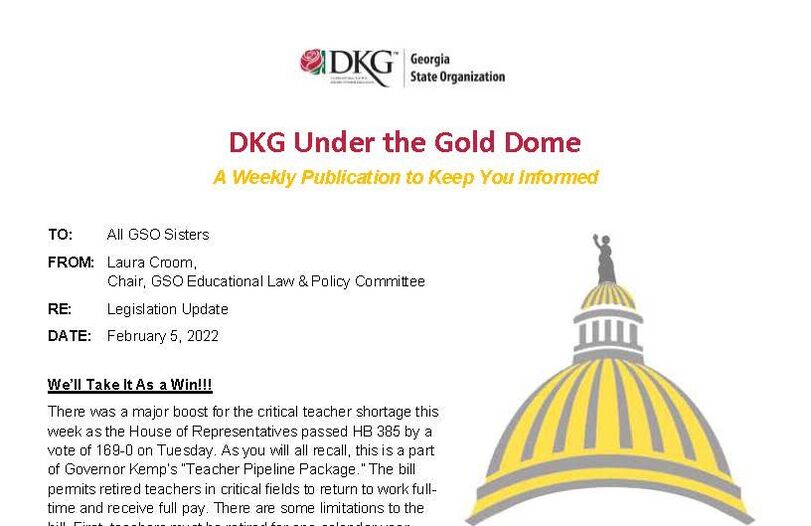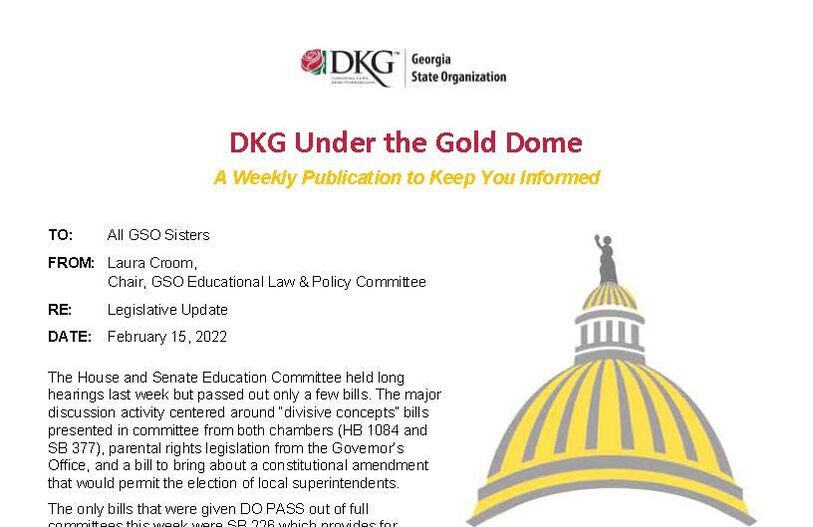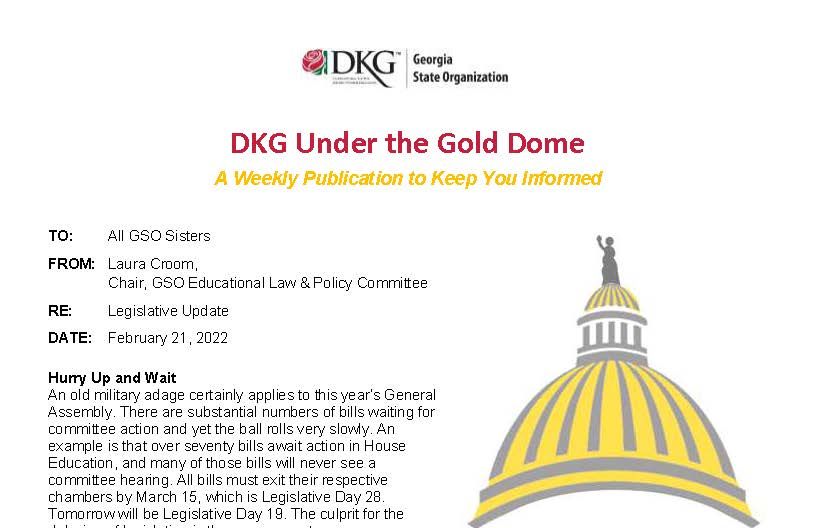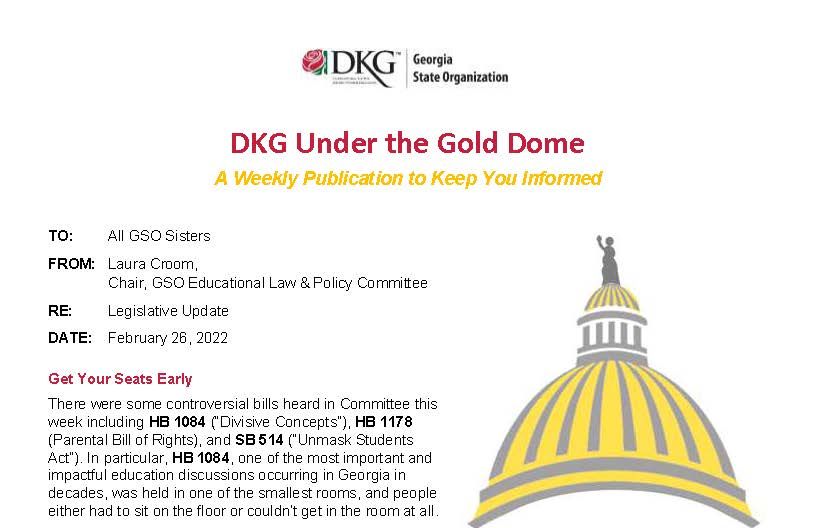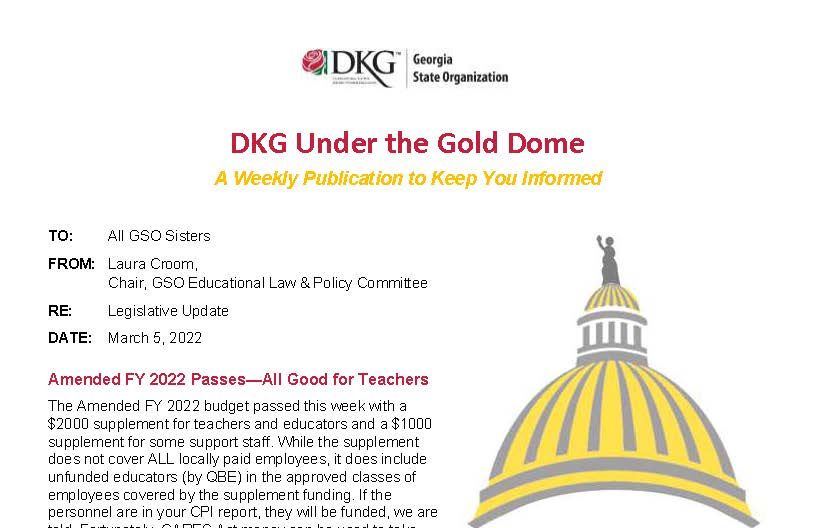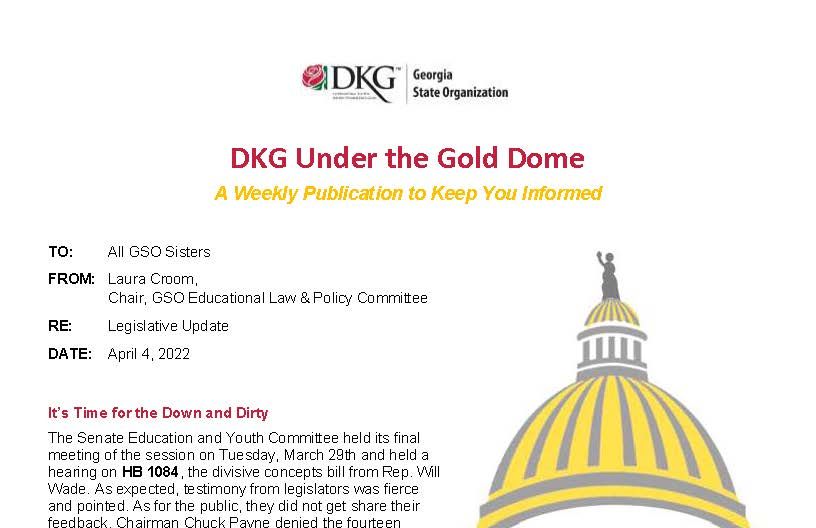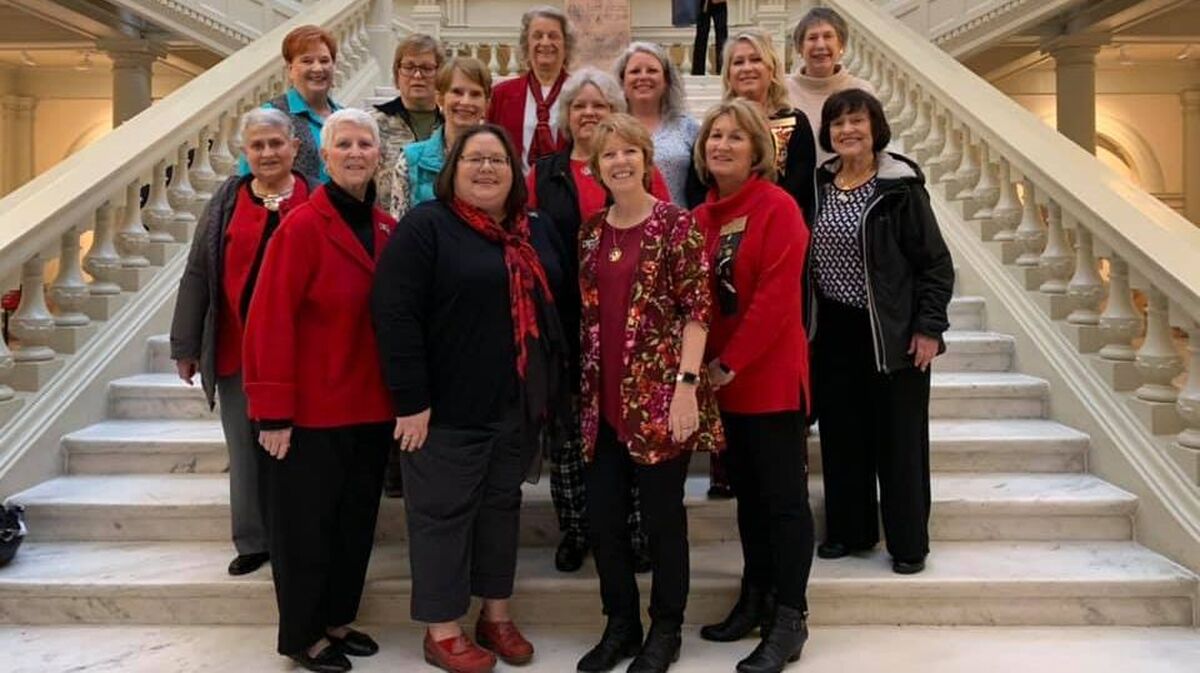Purpose 4: Initiate, endorse and support desirable legislation
DKG Under the Gold Dome
The pandemic has made it unadvisable to hold the annual DKG Day at the Capitol in 2021 and 2022.
To keep us informed so that we can endorse and support desirable legislation,
the GSO Education Law & Policy Committee is producing and distributing weekly newsletters
with up-to-date information about what is going on under Georgia's gold dome while our legislature is in session.
To keep us informed so that we can endorse and support desirable legislation,
the GSO Education Law & Policy Committee is producing and distributing weekly newsletters
with up-to-date information about what is going on under Georgia's gold dome while our legislature is in session.
Recap of
2020 DKG Day at the Capitol
February 26, 2020
Under the Gold Dome
|
Legislative Priorities
Teacher Retirement System
|
Budget Cuts Reduce all spending by 6%
Private School Vouchers
Dual Enrollment Reduction/Move On When Ready
Raising Age of Compulsory Attendance
Foster Care IEP:
Coach Safety Act
Homeschooled Students
L4GA Grant
New Regulations on Vaping Proposed
School Safety Plan
Student Loan Forgiveness Bill for Teachers
High-Stakes Testing:
Census 2020
TPPEM: Teacher Preparation Program Effective Measure
Contact Your Legislators Make your letters/emails/phone calls brief, to the point, relate personal information in a pleasant tone. |
Scenes and Interactions
2019 DKG Day at the Capitol
Kirk Shook
Executive Director of Post-Secondary Commission
Mr. Shook explained his title and what his office does. Kirk just finished his time as a classroom teacher in January. He and his office oversee and give accreditation to the private college institutes in Georgia. They are working together with these institutes to bridge the gap between high school and career readiness. His office currently has 288 institutions under their umbrella. Mr. Shook stated that he too is worried about TRS and the raise proposal. He has 12 years in TRS and is vested in it staying around. His wife is a media specialist and would like to see all school employees get the raise. Mr. Shook stated he would be lobbying for those things and suggested we do the same by contacting our representatives. kshook@gnpec.ga.gov
Mr. Shook explained his title and what his office does. Kirk just finished his time as a classroom teacher in January. He and his office oversee and give accreditation to the private college institutes in Georgia. They are working together with these institutes to bridge the gap between high school and career readiness. His office currently has 288 institutions under their umbrella. Mr. Shook stated that he too is worried about TRS and the raise proposal. He has 12 years in TRS and is vested in it staying around. His wife is a media specialist and would like to see all school employees get the raise. Mr. Shook stated he would be lobbying for those things and suggested we do the same by contacting our representatives. kshook@gnpec.ga.gov
Matthew Gambill
District 15 Legislator, Cartersville
This is Mr. Gambill’s 18th day on the job. Although he is in a new position, he has been in the political and educational arenas for some time serving as a lobbyist for CTAE (Career Technology, Agriculture Education). Mr. Gambill is on the Economic Development Committee but plans to work closely with the Education Committee to oversee bills. Currently, Matthew is interested in the bill that will allow the Hope Eligibility to be extended from 7 to 11 years. House Bill 109 (Please read it if you haven’t!!!) is another concern of Mr. Gambill. He is concerned it will be changed from Defined Benefits to Defined Contributions. Revision for the bill will be made this week. It is proposed that new employees would contribute at a higher rate in a Defined Contributions account. Mr. Gambill discussed the QBE formula and feels that it needs to be updated and more money needs to be contributed to each student. The pay raise is a concern of his. He feels teachers deserve the raise and does not agree with the fact that school counselors, principals, media specialist, superintendents, etc. will not benefit from the raise. Matthew.Gambill@house.ga.gov
This is Mr. Gambill’s 18th day on the job. Although he is in a new position, he has been in the political and educational arenas for some time serving as a lobbyist for CTAE (Career Technology, Agriculture Education). Mr. Gambill is on the Economic Development Committee but plans to work closely with the Education Committee to oversee bills. Currently, Matthew is interested in the bill that will allow the Hope Eligibility to be extended from 7 to 11 years. House Bill 109 (Please read it if you haven’t!!!) is another concern of Mr. Gambill. He is concerned it will be changed from Defined Benefits to Defined Contributions. Revision for the bill will be made this week. It is proposed that new employees would contribute at a higher rate in a Defined Contributions account. Mr. Gambill discussed the QBE formula and feels that it needs to be updated and more money needs to be contributed to each student. The pay raise is a concern of his. He feels teachers deserve the raise and does not agree with the fact that school counselors, principals, media specialist, superintendents, etc. will not benefit from the raise. Matthew.Gambill@house.ga.gov
Valencia Stovall
District 74 Legislator, Conyers
Mrs. Stovall is on the Education Committee. She stated they would be addressing issues with the pay raise this week. School counselors and media specialist are being considered for the raise. Last year the QBE was fully funded, however, the formula has not been updated since 1985. Three models have been proposed by the ESSA, but the state has not decided on one. The Georgia Public Foundation has proposed a bill that would provide individuals and businesses with tax cuts if they donate and support the Wrap-Around School Model in their area. Currently, Marietta High School has a successful Wrap-Around Program. Valencia.Stoval@house.ga.gov
Mrs. Stovall is on the Education Committee. She stated they would be addressing issues with the pay raise this week. School counselors and media specialist are being considered for the raise. Last year the QBE was fully funded, however, the formula has not been updated since 1985. Three models have been proposed by the ESSA, but the state has not decided on one. The Georgia Public Foundation has proposed a bill that would provide individuals and businesses with tax cuts if they donate and support the Wrap-Around School Model in their area. Currently, Marietta High School has a successful Wrap-Around Program. Valencia.Stoval@house.ga.gov
Martha Zollar
Director of State Field Office
Martha represented Governor Kemp’s office since he was unable to attend. She said the Governor is excited to start with a $3000 raise for teachers but will continue to push for the full $5000 he had originally wanted. The new app for Mental Health is up and running. House Bill 109 will be studied and revised this week. School systems around the state are seeing growth. Therefore, money is being set aside to enlarge schools and repair schools in Southwest Georgia after Hurricane Michael. State Superintendent Woods has put a school nurse back into every school. In rural areas, school nurses will provide Tela-Doctors services. Martha stated she would be happy to come out and speak to any groups regarding political issues on the forefront. Martha.Zoller@georgia.gov
Martha represented Governor Kemp’s office since he was unable to attend. She said the Governor is excited to start with a $3000 raise for teachers but will continue to push for the full $5000 he had originally wanted. The new app for Mental Health is up and running. House Bill 109 will be studied and revised this week. School systems around the state are seeing growth. Therefore, money is being set aside to enlarge schools and repair schools in Southwest Georgia after Hurricane Michael. State Superintendent Woods has put a school nurse back into every school. In rural areas, school nurses will provide Tela-Doctors services. Martha stated she would be happy to come out and speak to any groups regarding political issues on the forefront. Martha.Zoller@georgia.gov
Sandra Scott
Mrs. Scott was an educator herself. She believes elementary schools fail students, because they do not have the money and/or skills to solve student problems (mental, social, economic, nor academic). She believes the Wrap-Around Program would benefit students and would like to see parents be held accountable. Mrs. Scott has proposed House Bill 40. It would provide local systems with test materials to conduct screening for dyslexia students in grades Kindergarten through Second instead of waiting until they are older. Sandra.Scott@house.ga.gov
Eddie Lumsden
District 12, Rome
Mr. Lumsden is a retired state trooper. His father and wife were teachers. His wife served on the local school board. Mr. Lumsden stated he supported the Mental Health Bill. This bill will assist in identifying students with mental health disorders and provide them with services and medication, if necessary. There is also the possibility of adding extra counselors in the school districts. He felt like safety is very important, therefore, the Security Grant was a high priority for him. He felt the grant’s use should be left up to the school district in order to meet the cultural needs of the communities. Mr. Lumsden stated that TRS had to change, because there are fewer people putting money in than taking money out. He feels this problem will continue to grow as we move forward. He would like to see more management of TRS to see where the weaknesses are and how to proceed forward. Eddie.Lumsden@house.ga.gov
Mr. Lumsden is a retired state trooper. His father and wife were teachers. His wife served on the local school board. Mr. Lumsden stated he supported the Mental Health Bill. This bill will assist in identifying students with mental health disorders and provide them with services and medication, if necessary. There is also the possibility of adding extra counselors in the school districts. He felt like safety is very important, therefore, the Security Grant was a high priority for him. He felt the grant’s use should be left up to the school district in order to meet the cultural needs of the communities. Mr. Lumsden stated that TRS had to change, because there are fewer people putting money in than taking money out. He feels this problem will continue to grow as we move forward. He would like to see more management of TRS to see where the weaknesses are and how to proceed forward. Eddie.Lumsden@house.ga.gov
Kate Dempsey
District 13, Rome
Mrs. Dempsey has an Early Childhood Education degree. She is an advocate that wants mental health to be provided to all citizens. She is on the School Safety Commission. As a member of the group, she is working on providing Suicide Prevention Training. She would like to see counselors be the person that connects students to the resources to assist in solving issues. The new app for mental health was rolled out Thursday. It is called My GCAL App. It is available 24/7. It is a touch app where you can call, text, or use resources to solve crisis situations. The commission will be getting statistics on the app as soon as next week. Mrs. Dempsey would like to focus on the younger students’ mental health, because they are being exposed to so much at such a young age and are not cognitively ready to deal with the issues and/or understand. Katie.Dempsey@house.ga.gov
Mrs. Dempsey has an Early Childhood Education degree. She is an advocate that wants mental health to be provided to all citizens. She is on the School Safety Commission. As a member of the group, she is working on providing Suicide Prevention Training. She would like to see counselors be the person that connects students to the resources to assist in solving issues. The new app for mental health was rolled out Thursday. It is called My GCAL App. It is available 24/7. It is a touch app where you can call, text, or use resources to solve crisis situations. The commission will be getting statistics on the app as soon as next week. Mrs. Dempsey would like to focus on the younger students’ mental health, because they are being exposed to so much at such a young age and are not cognitively ready to deal with the issues and/or understand. Katie.Dempsey@house.ga.gov
Other Issues and Topics
- School calendar being mandated by the state
- Threat assessment and profile of each student
- Increasing the retirement age from 60 to 62
- Taking money from and making adjustments to TRS
- Not allowing sick days to be used toward retirement
- Lack of incentives to encourage teachers to stay in the field
- Lack of applicants in the UGA Education Department and other universities and colleges around the state
- Demands and costs on student teachers to get accreditation
- Raise only being $3000 instead of $5000 (When will it be distributed? Will it be the county’s decision?)
- Raise not including media specialist, school counselors, principals, superintendents, etc.
- Private school vouchers
- $69 million Security Grant ($30k for each school)
- $6 million Audio/Visual and Technology Grant
- $131 million QBE adjustment
Graphics credits |
|
